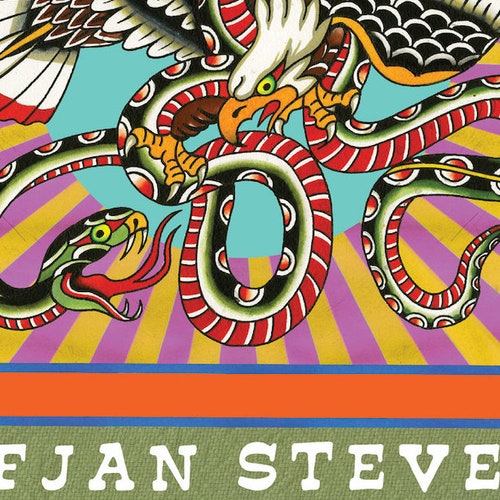Listen to “America” by Sufjan Stevens
“Christ would be ashamed of us all,” Sufjan Stevens wrote on Tumblr in early 2017, about the refugee crisis, days after the inauguration of Donald Trump. “The truest of ‘Americans,’” he wrote, “have either been destroyed by the white immigrant, incarcerated, isolated, held captive, or stolen and enslaved.” His words felt impassioned and precise, and they cut even deeper considering his explorations as a songwriter over the past two decades: his tender narratives of faith and faithlessness, humanity and hopelessness, his own personal tempests and the deeper tests that await us all.
Stevens’ new song, which is called “America,” feels similarly haunted. Its 12 minutes are filled with rhetorical questions and biblical allusions as he returns to subjects he’s revisited again and again, casting them all as signs of the apocalypse. “The dove flew to me like a vision of paranoia,” he sings, and nothing in the song’s characteristically sprawling arsenal—its symphonic slow-build, its sea of recorders, its climactic, singalong chorus—seems able to soothe his fears. As the first single from The Ascension, the 80-minute album he’s billing as the follow-up to 2015’s quiet, autobiographical Carrie & Lowell, it arrives as its own dark omen.
At the core of the song is a crisis of faith. “Is it love you’re after?” he sings over a hospital pulse in the opening lines. His question conjures the title of a ’70s disco classic that found dancefloor euphoria in the space between genuine revelation and everyday, ordinary emotion, and through his own quandary, Stevens’ words sound like a confrontation. “I’m ashamed to admit I no longer believe,” he confesses. “Don’t do to me what you did to America,” he sings in each chorus. The music swells and fades, calling back to the dense orchestration of 2010’s noisy opus The Age of Adz, its sputtering neon now rendered in muted, somber tones.
“It’s funny,” Stevens said in the spring of 2017. “I feel less and less a personal misery and grief now—maybe I worked that out on [Carrie & Lowell].” On the tour for that album, he extended those familial stories of loss into something climactic and explosive: private spirals designed to pull all of us down with him. “Now I feel a universal dread that I had never felt before,” he continued. “It feels like it’s not my problem, it’s our problem.” After all its grand gestures and sweeping questions, “America” closes with a long, slow drone of piano and echoing vocals: a mournful fadeout that lasts longer than most of the songs on Seven Swans. Back in those days, Stevens’ music felt like a scenic landscape, safe for navigating these types of worries. Now, he’s dispensed with the romance. We’re in this together, he suggests, and we are as alone as we’ve ever been.
Listen to our Best New Music playlist on Spotify and Apple Music.
